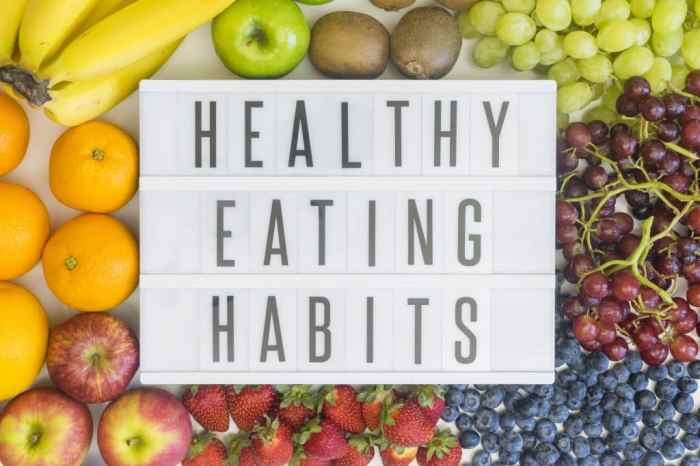Healthy Eating Habits kick off this journey to a better you, where fruits, veggies, and whole grains take center stage in boosting your energy and well-being. Get ready for a flavorful ride filled with tips and tricks to nourish your body like never before.
Benefits of Healthy Eating Habits

Eating a diet rich in fruits and vegetables is crucial for maintaining good health. These foods are packed with essential vitamins, minerals, and antioxidants that support overall well-being and help prevent chronic diseases.
The Importance of Fruits and Vegetables
- Fruits and vegetables are high in fiber, which aids in digestion and helps you feel full longer, reducing the urge to overeat.
- They are low in calories but high in nutrients, making them an excellent choice for weight management.
- The antioxidants in fruits and vegetables protect your cells from damage and reduce the risk of cancer and other diseases.
Improving Overall Well-being and Boosting Energy Levels, Healthy Eating Habits
- Healthy eating habits provide the necessary nutrients to support your body’s functions, leading to increased energy levels and improved mood.
- A balanced diet can help maintain a healthy weight, reduce the risk of obesity-related conditions, and promote overall well-being.
- By fueling your body with nutritious foods, you can enhance your physical and mental performance throughout the day.
The Role of Whole Grains in a Balanced Diet
- Whole grains are a great source of fiber, vitamins, and minerals that are essential for good health.
- They help regulate blood sugar levels, improve digestion, and reduce the risk of heart disease, stroke, and type 2 diabetes.
- Incorporating whole grains like brown rice, quinoa, and oats into your meals can provide long-lasting energy and keep you feeling satisfied.
Healthy Fats and Heart Health
- Healthy fats, such as those found in avocados, nuts, and olive oil, are essential for heart health and brain function.
- These fats can help reduce bad cholesterol levels, lower the risk of heart disease, and improve overall cardiovascular health.
- Including sources of healthy fats in your diet in moderation can have a positive impact on your heart health and overall well-being.
Building Healthy Eating Habits
Establishing healthy eating habits is crucial for overall well-being and maintaining a healthy lifestyle. Here are some tips and strategies to help you build and sustain these habits:
Meal Planning for a Balanced Diet
Meal planning is key to ensuring you consume a variety of nutrients and maintain a balanced diet. Consider the following when planning your meals:
- Include a mix of fruits, vegetables, whole grains, lean proteins, and healthy fats in your meals.
- Plan your meals in advance to avoid impulsive and unhealthy food choices.
- Prepare healthy snacks to have on hand to prevent reaching for processed foods.
Reducing Sugar Intake in Daily Meals
Reducing sugar intake is essential for managing weight and preventing health issues such as diabetes and heart disease. Here are some strategies to help you cut down on sugar:
- Avoid sugary beverages like soda and opt for water, herbal tea, or infused water instead.
- Read food labels carefully to identify hidden sugars in packaged foods.
- Choose whole fruits over fruit juices or sweetened snacks for a natural source of sweetness.
Significance of Portion Control for Maintaining a Healthy Weight
Practicing portion control is important for managing weight and preventing overeating. Consider the following tips for portion control:
- Use smaller plates to visually trick your brain into thinking you are eating more.
- Measure out serving sizes to avoid consuming more than necessary.
- Listen to your body’s hunger cues and stop eating when you feel satisfied, not overly full.
Benefits of Mindful Eating Practices
Mindful eating involves being present and attentive while consuming food, which can lead to better digestion and overall health. Here are some benefits of mindful eating:
- Increased enjoyment of food and appreciation for flavors and textures.
- Improved digestion and nutrient absorption due to slower eating pace.
- Enhanced awareness of hunger and fullness cues, preventing overeating.
Impact of Healthy Eating on Mental Health
Eating a nutritious diet not only benefits our physical health but also plays a crucial role in maintaining good mental health. The food we consume can have a significant impact on our mood, cognitive function, and overall mental well-being.
Nutrition and Mood
Nutrition can directly affect our mood by influencing the production of neurotransmitters in the brain. For example, consuming foods rich in omega-3 fatty acids, such as salmon and walnuts, can help reduce symptoms of depression and anxiety. On the other hand, a diet high in processed foods and sugars may contribute to mood swings and irritability.
Gut Health and Mental Well-being
There is a strong connection between gut health and mental well-being, known as the gut-brain axis. The microbes in our gut play a crucial role in producing neurotransmitters that regulate mood and stress levels. Consuming probiotic-rich foods like yogurt and kimchi can help support a healthy gut and improve mental health.
Incorporating Brain-Boosting Foods
To enhance cognitive function and support mental clarity, it is essential to include brain-boosting foods in your diet. Foods rich in antioxidants, such as berries and leafy greens, can help protect the brain from oxidative stress and improve memory and concentration. Additionally, incorporating whole grains, nuts, and seeds can provide essential nutrients that support brain health.
The Role of Hydration
Staying hydrated is crucial for maintaining optimal brain function and mental clarity. Dehydration can lead to cognitive impairment, fatigue, and difficulty concentrating. Drinking an adequate amount of water throughout the day can help improve mood, focus, and overall cognitive performance.
Healthy Eating on a Budget

Eating healthy doesn’t have to break the bank. With some smart shopping and meal prepping, you can stick to your budget while still nourishing your body with nutrient-dense foods.
Smart Shopping Tips
- Make a grocery list and stick to it to avoid impulse buys.
- Look for sales and discounts on healthy staples like whole grains, beans, and frozen fruits and vegetables.
- Buy in bulk for items you use frequently, like rice or oats, to save money in the long run.
- Compare prices at different stores or consider shopping at discount grocers for budget-friendly options.
Benefits of Buying Seasonal Produce
Purchasing fruits and vegetables that are in season not only saves you money but also ensures that you are getting the freshest produce available. Seasonal produce is often more flavorful and nutrient-rich compared to out-of-season varieties.
Meal Prep to Save Time and Money
- Plan your meals for the week ahead of time to avoid last-minute takeout or convenience foods.
- Cook in batches and portion out meals to have ready-to-eat options throughout the week.
- Use versatile ingredients that can be used in multiple dishes to minimize waste and maximize your grocery budget.
- Invest in reusable containers for easy storage and transportation of prepped meals.
Prioritizing Nutrient-Dense Foods
When sticking to a budget, focus on purchasing nutrient-dense foods that provide the most bang for your buck in terms of nutrition. Opt for whole foods like fruits, vegetables, whole grains, lean proteins, and healthy fats to fuel your body without emptying your wallet.
